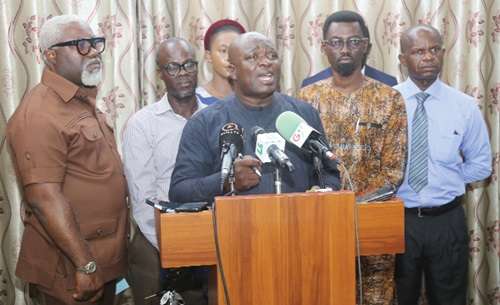The Ghana Publishers Association (GPA) has called on the government to release the remaining 80 per cent of contract sum owed members for producing textbooks for primary schools.
The association said that would reduce further liabilities its members were saddled with.
The President of the GPA, Asare Konadu Yamoah, said at the 47th Annual General Meeting (AGM) of the association in Accra yesterday that only about 20 per cent of the contract sum had been paid in August this year.
“The contracted publishers and the GPA are urging the Minister of Education, Dr Yaw Osei Adutwum, to release the remaining 80 per cent now,” the President of the GPA.
The event was on the theme: “Book Procurement in Ghana: Resolving Challenges for Industrial Growth”.
Context
In 2021, the government ceded 100 per cent of the printing of textbooks for pupils in basic schools to local printers.
For pre-qualification, all local publishers were directed to present their documents, which included signed contracts with local printers.
The Minister of Education warned that publishers without agreements with local printers would not be considered in the offer.
For a start, the government said the textbooks to be printed would cover kindergarten to primary six.
“The whole idea is that we want to encourage and empower the local printing business,” Dr Adutwum told the Daily Graphic.
In June last year, five local printers subsequently commenced the printing of government textbooks for basic schools under the new curriculum.
The printers are G-PAK Ltd, a subsidiary of the Graphic Communications Group Ltd; the Buck Press, Appointed Time Printing Ltd, Jay Kay Industries Ltd and Sec-print Ltd.
The printers which secured the printing contracts had three months to complete the jobs and a month to deliver the books to the schools.
The government, subsequently, took custody of the first batch of textbooks from Appointed Time Printing Ltd in July last year.
Following the delay in the payment for work done, the publishers appealed to the government to honour its part of the agreement since it was affecting their operations.
Recovery
Mr Yamoah stated that Ghanaian publishers had not yet completely recovered from the negative effects of the COVID-19 pandemic and the abrupt withdrawal of textbooks in 2018 as a result of curriculum change.
“Moreover, internally, the right thing must be done in order not to collapse well-established businesses.
The contracted publishers and the association have been excessively patient and we request the Minister of Education to respect that and be sensitive to the plight of the publishers,” the GPA President said.
Mr Yamoah said book procurement was a critical aspect of the publishing process which kept publishers operational and sustainable.
Procurement of books in the country, he said, had attracted a lot of challenges and it certainly demanded public discourse for strategic intervention by the government and the private sector, adding that “Ghana’s textbook publishing, procurement and distribution have transitioned from a government-controlled process to a private sector, indigenous publishing”.
He said from 1997 to 2002, the publishing industry, made up of indigenous publishers, authors, printers, booksellers and other allied service providers, worked with the government to make the textbook publishing a fully private sector-led process.
Policy
Further to that, Mr Yamoah said a national Textbook Development Policy was formulated, saying that in 2004, the Ministry of Education successfully procured school textbooks from indigenous publishers.
“This is by far the best book procurement process and its transparency encouraged the continuation of the programme,” he said.
However, Mr Yamoah said, a number of unfortunate events had given rise to procurement challenges which included perceived manipulations, the use of discretionary powers instead of documented policies, untimely change of curriculum and the lack of a procurement plan and policies.
The others are delayed payment for books by the Ministry of Education, the demand of outrageous discounts by heads of schools, difficulty in getting payments for books distributed on credit and the low level of government commitment and investment in the procurement of books.
Mr Yamoah said to resolve challenges of procurement of books confronting the publishing industry, the GPA had recommended a sustainable book procurement policy from the Ministry of Education.
The policy, he said, must have credible guidelines for the book procurement, timetable for the procurement of pre-tertiary textbooks and supplementary readers, scheduled timeliness for the review and development of curriculum, the provision of a payment plan and a strong commitment of the government to comply with the payment plan.
In the keynote address, the General Secretary of the Ghana National Association of Private Schools (GNAPS), Justice King Essiel, said a 2020-2021 report from UNESCO confirmed that about 580,751 students entered the tertiary sector in addition to the three million that existed and “so you have a big market of students”.
He said several textbooks would be needed for such students in order to meet the requirements of their programmes.
Mr Essiel said there was the need to improve the reading culture in the country without which the publishing industry would be dead.
“So we must begin to nurture people who would read and then we will be able to make business out of that,” he posited and charged the association to endeavour to sponsor programmes of schools in order to get the opportunity to market their products.
The Head of Publishing Studies Department of the Kwame Nkrumah University of Science and Technology (KNUST), Dr Lucy Afeafa Ry-Kottoh, said the purchasing of instructional materials and books was essential to the society’s ability to sustain its educational system and enhance literacy.
She said the theme for the AGM was apt for the industry that depended predominantly on government’s procurement of books.
There were solidarity messages from stakeholders in the book industry.









































